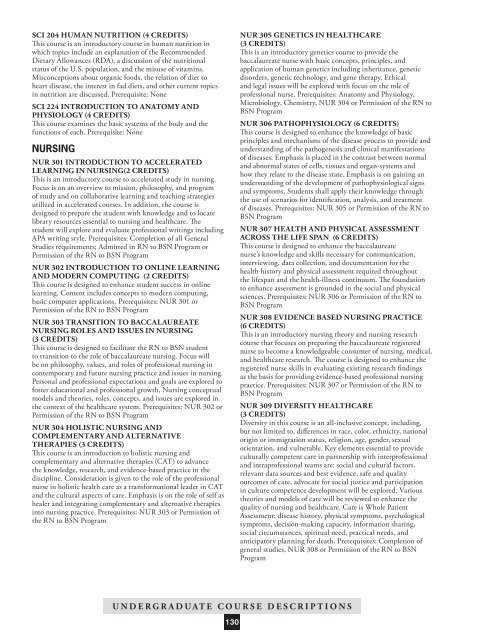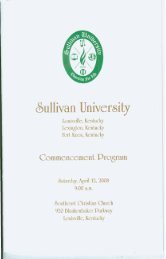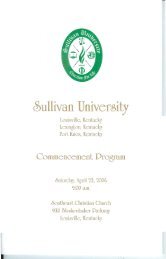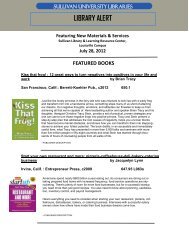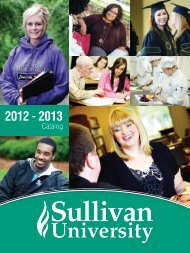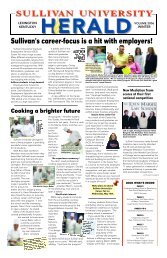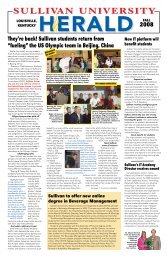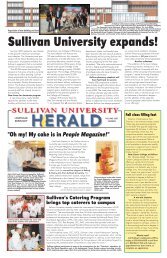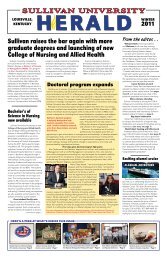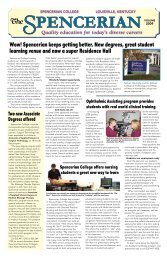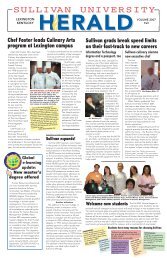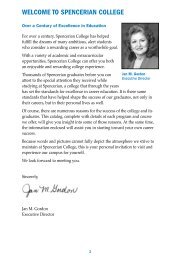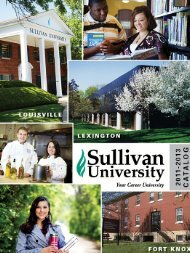Undergraduate Course Descriptions - Sullivan University | Library
Undergraduate Course Descriptions - Sullivan University | Library
Undergraduate Course Descriptions - Sullivan University | Library
You also want an ePaper? Increase the reach of your titles
YUMPU automatically turns print PDFs into web optimized ePapers that Google loves.
SCI 204 HUMAN NUTRITION (4 CREDITS)<br />
This course is an introductory course in human nutrition in<br />
which topics include an explanation of the Recommended<br />
Dietary Allowances (RDA), a discussion of the nutritional<br />
status of the U.S. population, and the misuse of vitamins.<br />
Misconceptions about organic foods, the relation of diet to<br />
heart disease, the interest in fad diets, and other current topics<br />
in nutrition are discussed. Prerequisite: None<br />
SCI 224 INTRODUCTION TO ANATOMY AND<br />
PHYSIOLOGY (4 CREDITS)<br />
This course examines the basic systems of the body and the<br />
functions of each. Prerequisite: None<br />
NURSING<br />
NUR 301 INTRODUCTION TO ACCELERATED<br />
LEARNING IN NURSING(2 CREDITS)<br />
This is an introductory course to accelerated study in nursing.<br />
Focus is on an overview to mission, philosophy, and program<br />
of study and on collaborative learning and teaching strategies<br />
utilized in accelerated courses. In addition, the course is<br />
designed to prepare the student with knowledge and to locate<br />
library resources essential to nursing and healthcare. The<br />
student will explore and evaluate professional writings including<br />
APA writing style. Prerequisites: Completion of all General<br />
Studies requirements; Admitted in RN to BSN Program or<br />
Permission of the RN to BSN Program<br />
NUR 302 INTRODUCTION TO ONLINE LEARNING<br />
AND MODERN COMPUTING (2 CREDITS)<br />
This course is designed to enhance student success in online<br />
learning. Content includes concepts to modern computing,<br />
basic computer applications. Prerequisites: NUR 301 or<br />
Permission of the RN to BSN Program<br />
NUR 303 TRANSITION TO BACCALAUREATE<br />
NURSING ROLES AND ISSUES IN NURSING<br />
(3 CREDITS)<br />
This course is designed to facilitate the RN to BSN student<br />
to transition to the role of baccalaureate nursing. Focus will<br />
be on philosophy, values, and roles of professional nursing in<br />
contemporary and future nursing practice and issues in nursing.<br />
Personal and professional expectations and goals are explored to<br />
foster educational and professional growth, Nursing conceptual<br />
models and theories, roles, concepts, and issues are explored in<br />
the context of the healthcare system. Prerequisites: NUR 302 or<br />
Permission of the RN to BSN Program<br />
NUR 304 HOLISTIC NURSING AND<br />
COMPLEMENTARY AND ALTERNATIVE<br />
THERAPIES (3 CREDITS)<br />
This course is an introduction to holistic nursing and<br />
complementary and alternative therapies (CAT) to advance<br />
the knowledge, research, and evidence-based practice in the<br />
discipline. Consideration is given to the role of the professional<br />
nurse in holistic health care as a transformational leader in CAT<br />
and the cultural aspects of care. Emphasis is on the role of self as<br />
healer and integrating complementary and alternative therapies<br />
into nursing practice. Prerequisites: NUR 303 or Permission of<br />
the RN to BSN Program<br />
130<br />
NUR 305 GENETICS IN HEALTHCARE<br />
(3 CREDITS)<br />
This is an introductory genetics course to provide the<br />
baccalaureate nurse with basic concepts, principles, and<br />
application of human genetics including inheritance, genetic<br />
disorders, genetic technology, and gene therapy. Ethical<br />
and legal issues will be explored with focus on the role of<br />
professional nurse. Prerequisites: Anatomy and Physiology,<br />
Microbiology, Chemistry, NUR 304 or Permission of the RN to<br />
BSN Program<br />
NUR 306 PATHOPHYSIOLOGY (6 CREDITS)<br />
This course is designed to enhance the knowledge of basic<br />
principles and mechanisms of the disease process to provide and<br />
understanding of the pathogenesis and clinical manifestations<br />
of diseases. Emphasis is placed in the contrast between normal<br />
and abnormal states of cells, tissues and organ-systems and<br />
how they relate to the disease state. Emphasis is on gaining an<br />
understanding of the development of pathophysiological signs<br />
and symptoms. Students shall apply their knowledge through<br />
the use of scenarios for identification, analysis, and treatment<br />
of diseases. Prerequisites: NUR 305 or Permission of the RN to<br />
BSN Program<br />
NUR 307 HEALTH AND PHYSICAL ASSESSMENT<br />
ACROSS THE LIFE SPAN (6 CREDITS)<br />
This course is designed to enhance the baccalaureate<br />
nurse’s knowledge and skills necessary for communication,<br />
interviewing, data collection, and documentation for the<br />
health history and physical assessment required throughout<br />
the lifespan and the health-illness continuum. The foundation<br />
to enhance assessment is grounded in the social and physical<br />
sciences. Prerequisites: NUR 306 or Permission of the RN to<br />
BSN Program<br />
NUR 308 EVIDENCE BASED NURSING PRACTICE<br />
(6 CREDITS)<br />
This is an introductory nursing theory and nursing research<br />
course that focuses on preparing the baccalaureate registered<br />
nurse to become a knowledgeable consumer of nursing, medical,<br />
and healthcare research. The course is designed to enhance the<br />
registered nurse skills in evaluating existing research findings<br />
as the basis for providing evidence-based professional nursing<br />
practice. Prerequisites: NUR 307 or Permission of the RN to<br />
BSN Program<br />
NUR 309 DIVERSITY HEALTHCARE<br />
(3 CREDITS)<br />
Diversity in this course is an all-inclusive concept, including,<br />
but not limited to, differences in race, color, ethnicity, national<br />
origin or immigration status, religion, age, gender, sexual<br />
orientation, and vulnerable. Key elements essential to provide<br />
culturally competent care in partnership with interprofessional<br />
and intraprofessional teams are: social and cultural factors,<br />
relevant data sources and best evidence, safe and quality<br />
outcomes of care, advocate for social justice and participation<br />
in culture competence development will be explored. Various<br />
theories and models of care will be reviewed to enhance the<br />
quality of nursing and healthcare. Care is Whole Patient<br />
Assessment: disease history, physical symptoms, psychological<br />
symptoms, decision-making capacity, information sharing,<br />
social circumstances, spiritual need, practical needs, and<br />
anticipatory planning for death. Prerequisites: Completion of<br />
general studies, NUR 308 or Permission of the RN to BSN<br />
Program<br />
UNDERGRADUATE COURSE DESCRIPTIONS


